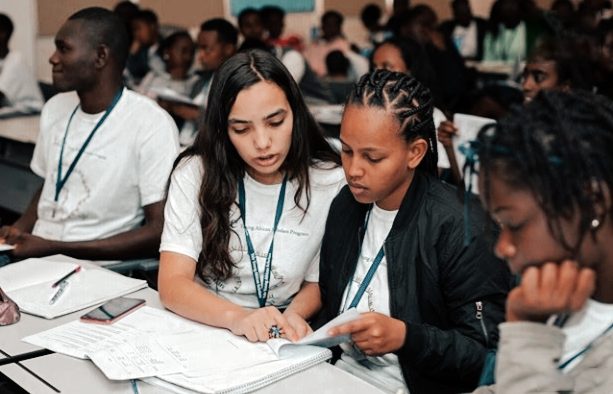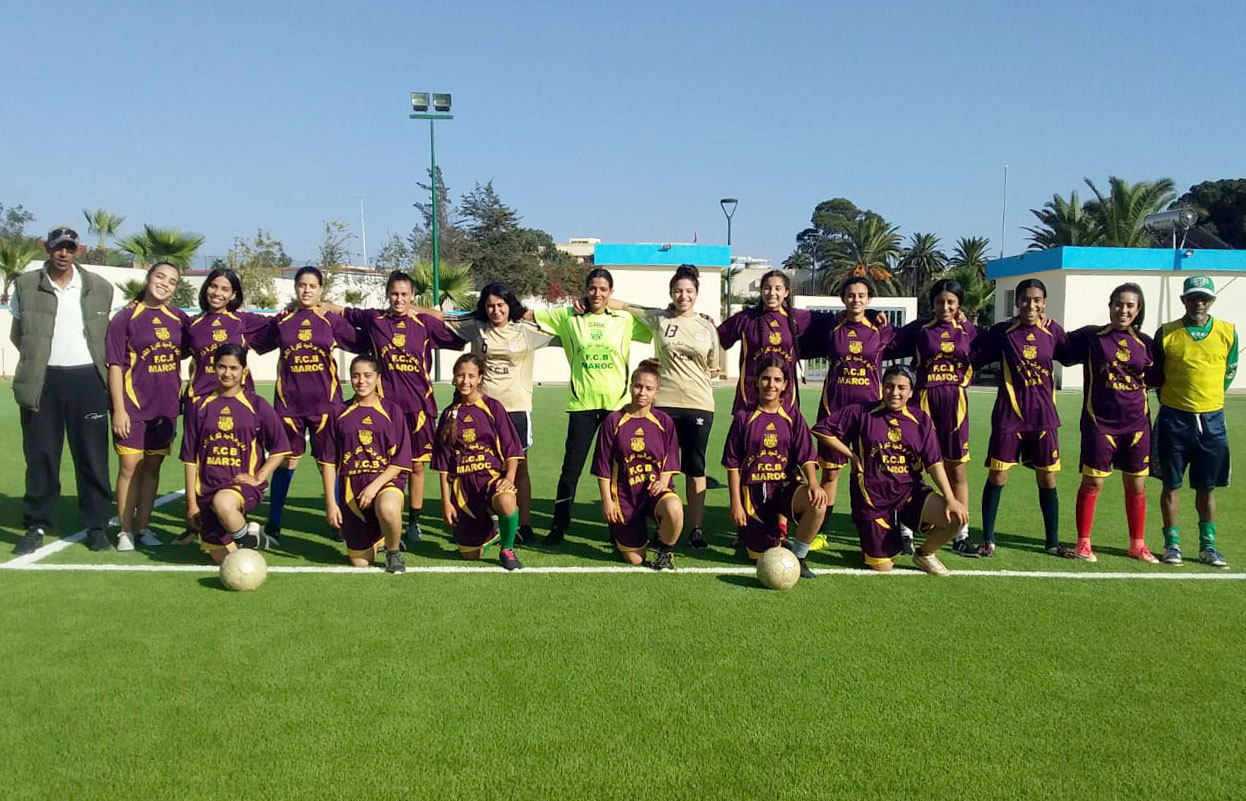
“You always have to try harder than any other guy in the room.” Rania Harrara has always had big ambitions, both in the classroom and on the soccer field. But growing up in Morocco, she found out the hard way that whatever skill and interest she and other girls shared in sports wouldn’t always be welcomed or celebrated. “No matter how good you are or how skilled you are, there’s always this gender barrier at every level in sports,” she explains. Now 18 and a college student in Florida, where she plays club soccer, she spoke to us on the eve of the 50th anniversary of Title IX, the U.S. law that changed the game for women’s participation in education and sports.
The U.S. is preparing to mark the 50th anniversary of Title IX being signed into law.
As an international student in the U.S. and a gender equality advocate, you’ve likely got thoughts on the law and its relevance today.
I think that Title IX really encouraged girls and women to take up space and enter fields that are predominantly masculine. It allowed more women to be fearless and pursue the fields they’re most passionate about. It really removed the barriers that prevented women from reaching their full potential by allowing them more access to educational and athletic opportunities.
Before, women were supposed to hold fundraisers in order to financially support their sports competitions, and they were not represented in certain academic careers.
We’ve obviously come a long way, but there’s still room for improvement because certain programs can still do a better job to fund and support more women athletes. Popular sports and male teams are still heavily favored by university officials and corporate sponsors.
What are some of the lessons about Title IX that you think other countries — even your home country of Morocco — can learn from?
Title IX protections really taught me that we need to make sure that no one is discriminated against. It’s important to remember that not everyone has the luxury to become an athlete. Not everyone can afford fancy sports academies, so it’s important to make these opportunities accessible to everyone who has the skills. I want to highlight that no woman will ever be empowered until all women are empowered and equal and have access to the same rights to learn, to play, and to work.
Title IX also made me realize that the gender equality fight is truly very intersectional with other fights like economic justice and social justice. Before going to college in Florida, I took a semester off to volunteer for a club team in my city in Morocco. There, I was able to see so many talented girls who sometimes had to take the bus for two hours just to get to practice. It made me sad to think: This girl is talented but is unable to pursue the sport further just because she’s born in a country that can’t meet her needs or create the infrastructure for talented female athletes to thrive. Many of these girls had to stop playing because they come from low-income backgrounds and [so] playing sports is a luxury. Instead, they have to find traditional work and help feed their families.

Let’s talk a bit more about that.
As a young advocate for gender equality both in the classroom and on the field, what are some of the other challenges you’ve seen here in the United States and in Morocco?
What has it been like for you personally?
Something that every girl can relate to is that you always have to try harder than any other guy in the room just to get a chance to prove yourself. No matter how good you are or how skilled you are, there’s always this gender barrier at every level in sports, but also in predominantly male fields like politics or STEM [science, technology, engineering, and mathematics]. For me, one of those experiences that impacted me the most was the recruitment season for my high school soccer team. No one knew anything about other players’ abilities, but I was the last one to be chosen for practice because I was the “least safe” option — just because I was a girl. Everyone would take another guy, and a team would be forced to have me because I was the only one left.
You’re also never taken seriously. When I was in high school, I was one of the coaches for my high school’s varsity handball team — the only girl coach for a boys’ team, and no one took my team seriously because of that. First, they harass you — they make comments about how you look or how attractive you are, and that’s something that men don’t have to go through when they coach women or girls.
It takes a lot of courage to take up space in those areas. In the classroom, I’ve experienced similar challenges because I’m studying politics, a field that’s not considered to be “feminine” in Morocco. I remember in high school when everyone would ask me, “What are you planning on studying?” and I would say, “I’m planning on studying politics.” The look in their eyes was telling me: “You’re probably going to change your mind in two weeks because we don’t have many women role models in politics.” I feel like that’s a key challenge for me because I have no one I can look up to and say, “She made it. I can also make it and become a politician.”
You’ve mentioned that one of your goals is to become Morocco’s first female prime minister.
Let’s just picture this for a moment: You’ve got executive power for a day.
What do you work to change immediately in sports programs and in the classroom for girls and women?
First, I would educate people about the importance of having women in leadership positions because it can be difficult for people to accept this in societies with patriarchal cultures. In Morocco, for example, we’ve seen the appointment of female ministers and the creation of a new gender equality committee. This is progress, but it’s not enough. Reserving a certain number of seats for women is not going to actually get more women involved in politics. I think the best way to increase girls’ and women’s participation in politics is by increasing their participation in university political science programs or organizing initiatives such as summer programs to enhance their exposure to politics.
In terms of sports, I would change two things: more funding and more media coverage for women’s teams. Many girls have to play for club sports to have a chance at getting recruited [by national teams or international clubs] because their high schools don’t support their women’s sports teams like they do their men’s teams when it comes to things like infrastructure or accommodations. These teams don’t get as much visibility or publicity as men’s teams, so there should also be increased media coverage for girls’ sporting events. More coverage means more attendance, which hopefully can eventually lead to equal pay between players. We need to rebrand the image of women’s sports in general in order to change how people perceive them.
Your own experience seems to reflect that sports can be life-changing for girls and women in particular.
For sure. I think sports break down barriers between people in general. No matter your skin color or economic background, when you’re on a team, you’re there to play just like anyone else on the team. Sports can help women raise their self-esteem and can help with self-empowerment. When I started playing sports, I just felt unstoppable. It made me realize that there is nothing I can’t do.
It’s those moments in the field where you lose, but then you get up and keep going. This kind of failure in sports really taught me to be resilient in life. Sports also helped me enhance my leadership skills and be a strategic problem-solver. The skills you learn in sports are relevant to life off the field and in your professional careers as well.

We’re reflecting on Title IX five decades later, and likely someone else will reflect on its impact 50 years from now.
How would you want to see future generations carrying on the fight to uphold its universal tenets?
It would be important to include men in the fight. We hardly ever see men’s teams and women’s teams collaborating together. If men’s teams can do more to support women’s sports, then this idea of girl and women athletes will become more normalized. When we think about sports, we immediately think about men’s sports, and women’s sports are seen as outcasts of sorts. If we do small things like having them train together or organizing mixed camps, then women’s teams will get more exposure and we can start to break the stigma around women’s sports.
Right now, there are girls and women looking to take up space in the classroom and on the field. What’s your message to them?
The main thing is that you shouldn’t feel required to give an explanation to anyone about any decision that you want to make. You don’t have to explain yourself or why you want to pursue a certain career or why you like a certain sport. Don’t listen to anyone who tries to convince you otherwise, and don’t be afraid to do what you’re passionate about. And if you can’t find someone to look up to, then become that person for other people.
 BACK TO STORIES
BACK TO STORIES